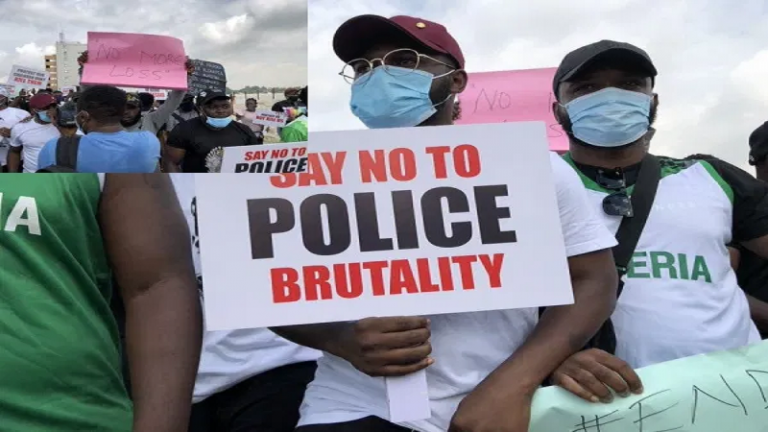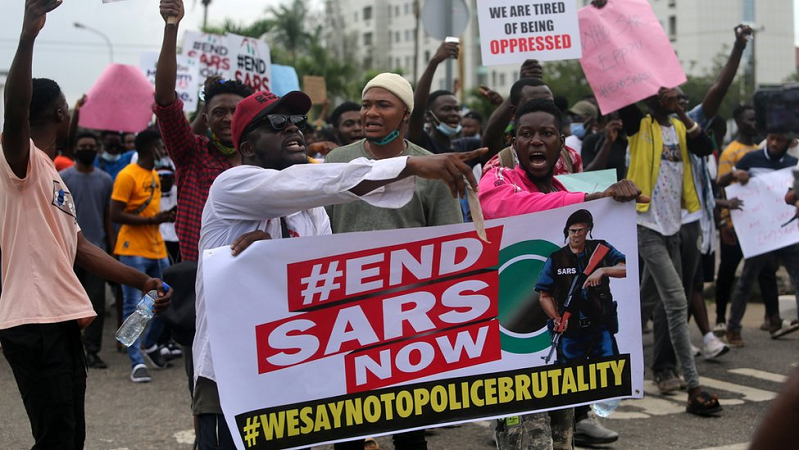
#EndSars! A call that has been heard over and over again in Nigeria from helpless youths, who have become victims of their supposed protectors, started ringing high once again in October.
The reason for the call has always been the same each time; the Special Anti-Robbery Squad (SARS), whose mandate is to protect the Nigerian people from armed robbery, has turned out to be what they were designed to fight.
The last time the call was near this loud was in 2017, when the horrifying stories of SARS activities became unbearable to the Nigerian people. The End SARS hashtag became top of trends on Twitter and people took to the streets to express what they can’t put out in 280 characters.
Register for Tekedia Mini-MBA edition 19 (Feb 9 – May 2, 2026): big discounts for early bird.
Tekedia AI in Business Masterclass opens registrations.
Join Tekedia Capital Syndicate and co-invest in great global startups.
Register for Tekedia AI Lab: From Technical Design to Deployment (next edition begins Jan 24 2026).
The outcry yielded results, and the government promised to reform the unit. In 2018, while acting in the capacity of acting president, following President Muhammadu Buhari’s medical trip to London, Nigeria’s Vice President Prof. Yemi Osinbajo gave marching orders to the then Inspector General of police (IGP), Ibrahim Idris, to carry out reforms that will ensure a service-driven anti-robbery police unit.
Idris went to work, initiating some measures that were geared toward taming the beasts in the men of SARS.
“The Inspector General of police in compliance with the presidential directives has ordered the immediate overhauling of the Special Anti-Robbery Squad to address complaints and allegations on human rights violations against some of the personnel of SARS from members of the public in some parts of the country,” statement from the police said following Osinbajo’s orders.
Among the reform measures taken by the IGP were the change of name for the squad from SARS to FSARS (federal special anti-robbery squad), a new uniform that would include identity tags, medical/psychological evaluation of all FSARS personnel.
According to the reform orders; “FSARS personnel will not perform Stop and Search duties except on distress call to respond to armed robbery and kidnapping offences only.” There was also an arrangement for a training program for the unit, in collaboration with civil society organizations, local and international NGOs and other human rights organizations.
Following this announcement by the Nigerian Police Boss, the voices died down and the hashtag disappeared.

Armed with the belief that the future has come when SARS will not harass, extort or kill anyone for having dread, tattoo, iphone or laptop, Nigerian youths went their daily business with their heads high. But it didn’t last; once again, the reform was short-lived.
The IGP Idris reached retirement age and was succeeded by Mohammed Adamu, who upon ascension to the throne rescinded all the reform measures apart from the new name – FSARS. The squad went back to streets, the outcries began once again and the #EndSARS hashtag crawled back to trends.
It has become a norm of occasional outbursts, emanating from culminating stories of brutality, extortion, killings, and most of all, impunity.
At each of the four times of the major outcries dating back to 2015, there has always been the government’s promise to reform SARS.
So on October 4, 2020, when IGP Adamu, in response to the fresh outcry of Nigerians, issued the ritual orders banning SARS and some other tactical squad units from conducting themselves unprofessionally, the words of the orders were all familiar because Nigerians have heard them many times before.
“The Inspector-General of Police, IGP M.A Adamu, has banned the personnel of the Federal Special Anti-Robbery Squad and other tactical squads of the force including the Special Tactical Squad (STS), Intelligence Response Team (IRT), Anti-Cultism Squad and other Tactical Squads operating at the Federal, Zonal and Command levels, from carrying out routine patrols and other conventional low-risk duties – stop and search duties, checkpoints, mounting of roadblocks, traffic checks, etc – with immediate effect,” the orders partly said.
It is not different from the orders given in the past that were flouted with all impunity, consequently enabling more sad tales of atrocities from members of SARS.
“I lived in the North for years and never lost a finger. Then I came back here (Southern Nigeria) and they (SARS) killed my son. No war. No fight. He wasn’t involved in armed robbery. Just cold blooded, they wasted this boy for me,” cried a man who SARS killed his teenage son.
This was just a tip of the iceberg among the horrifying stories that triggered the current events. The orders from the police chief were supposed to calm the online End SARS campaign, but it instead spurred the youth to hit the streets in united throng, for protests that have unprecedentedly become a global movement.
As the rest of the world lend their voice to the campaign, Buhari who is seen as too slow in responding to domestic matters, was believed to have been forced to make a statement addressing the chaos more than 72 hours after the protests broke out.
“I met again with the IGP tonight. Our determination to reform the police should never be in doubt. I am being briefed regularly on the reform efforts ongoing to end police brutality and unethical conduct, and ensure that the Police are fully accountable to the people.
“The IG already has my instructions to conclusively address the concerns of Nigerians regarding these excesses, & ensure erring personnel are brought to justice. I appeal for patience & calm, even as Nigerians freely exercise their right to peacefully make their views known,” the president said in a statement.
But like the orders of Adamu, the statement failed to calm the avalanche of tweets coming now from all corners of the earth and the accompanying street protests. And the reason could be found in some tweets put out on Twitter in response to the statement.
“There are currently checkpoints in Lagos being manned by SARS while the president is meeting the IG of police to discuss “reforms.”
“Also remember that SARS was banned 2 days ago by same president and IG of police, the 4th ban in 5 years. Enough of empty talks. #EndSarsNow,” Kelvin Odanz wrote on Twitter.
“Show me one SARS operative in prison for killing a citizen?” Henry Shield asked.
The decision of Nigerians not to back down this time stems not only from the ineffective orders in the past, but also current views from members of the president’s circle and the Police, which suggest that the ordered SARS’ reform is all ‘window dressing.’
The president’s media aide, Lauretta Onochie, in response to the campaign said she has no doubt that what is “going on now is a coordinated attack by cyber criminals joined by unsuspecting innocent citizens,” adding that this is not the first time.
It was also a stand taken by the Police spokesman, DCP Frank Mba, who in his defense of the Nigerian Police decision not to scrap SARS, said the unit is also being used in the fight against banditry in Nigeria’s North.
But cyber-related offenses are under the jurisdiction of the Economic and Financial Crimes Commission (EFCC), and the protestors are not calling on the government to end the Commission. On the other hand, there are rarely cases of SARS misconduct coming from Northern Nigeria, where the police spokesman claimed the unit is being used to combat banditry.
In Southern Nigeria, there is the everyday story of abduction, disappearance, maiming and killings. Amnesty International documented over 82 cases of atrocities committed by SARS between January 2017 and May 2020, outside the many more cases that didn’t come to light.
“Repeatedly, Nigerian authorities failed to end atrocities of SARS. This is hardly surprising when many of these officers have bribed their way to SARS in the first place. The police chiefs in charge are themselves entwined in the corruption,” Amnesty said.
The human right organization noted that financial gain, not service, has been the force driving recruitment and posting of the unit personnel, and many of them have criminal records.
“Officers sometimes pay superior officers responsible for transfers as much as N300,000 to influence their posting to SARS, as it is seen as a means of earning a substantial amount of money in a short time,” Amnesty said in a report.
All Nigerian authorities’ promises of reforming SARS have, so far, proven to be empty and ineffective. Restructuring SARS is not enough unless the government takes concrete steps to protect Nigerians. The report added.

Concerned Nigerians believe that the government’s failure to take drastic action to address SARS’ highhandedness and police malpractices once and for all times means endorsement of the rot in the police. And it stems from the belief that the Nigerian Police as it is was designed to serve the interest of a privileged few, mostly those in the corridors of power.
Therefore, having been overdosed by the consequences of ineffective reform promises, Nigerians seem to have had enough, and are pushing for one line of action they believe will end it all.
Among the nine demands the protestors are making is that all tactical squads formations across board of the police be scrapped and their responsibilities be transferred to proper structures within the police.
“You cannot build on nothing. Neither can you reform what’s not willing to be reformed. Nigerians want what’s best for Nigeria, and the most important at this time is to #EndSARS,” former Senator Ben Murray-Bruce wrote on Twitter.
His assertion that the Police are unwilling to be reformed was traced to the streets and confirmed to be true.
The number of video clips showing police’s use of excessive force on people protesting against police brutality, including the fatal shooting of one protestor, Jimoh Isiaq, indicates that SARS reform is far from the answer to SARS’ menace.
“You see, when an organization has lost credibility in the eyes of the public, it is almost impossible to recover,” former DG of Bureau of Public Service Reforms (BPSR), Dr. Joe Abah wrote on Twitter.
“Now when an organization has gained international notoriety for brutality and criminality, you should not be talking of reforming it. You should dismantle it and start afresh. The need for an anti-robbery squad may always be there. The need for SARS, as we know it, isn’t anymore.”




We are all say yes to end SARS because they are not do anything instead of guide people they just cheat them so that you are all say not to SARS so that you have to stop them thank
Iam by name mubarak
Bashir
Reason why stoping SARS is the best step for Nigeria and citizen and thank you very much
Reason why stoping SARS is the best step for Nigeria and citizen and thank you very much